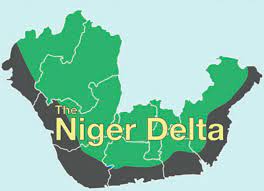A civil society organisation promoting economic and ecological justice in the Niger Delta, Policy Alert, has called on state governments in the region to “resist the temptation” of using the recent court judgments, ordering the Federal Government to pay some oil producing states their share of recalculated oil derivation revenue, as guarantee for new loans.
In a statement released Friday, Policy Alert’s executive director, Tijah Bolton-Akpan, warned that “any attempt by state governors to use the judgment as a source for immediate funding through loans, would undermine accountability, further compound the debt crisis facing states in the region, and cancel out any positive gains the sudden injection of funds could have had on fiscal space in the states.”
A string of Federal High Court judgments within the last few months had ordered the Federal Government to pay $2.258 billion to Akwa Ibom State, $1.638 billion to Delta State, $1.114 billion to Rivers State, and $951m to Bayelsa State, as their share of a recalculated oil derivation revenue, in line with Section 16(1) of the Deep Offshore and Inland Basin Production Sharing Contract (PSC) Act which obligates the government at the centre to adjust the Federation’s share in additional revenue if the price of crude oil at any time exceeds $20 per barrel.
Bolton-Akpan said: “The four states stand to receive a sudden inflow of $5.9 billion (equivalent to N2.42 trillion). This presents a rare opportunity to ensure that receipts from valuable, but exhaustible oil and gas resources, translate into higher living standards for these states and especially for the communities that bear the brunt of oil and gas extraction, both for the current generation and also for the future. While we call on the Federal Government to expedite action on the payments in line with the orders of the court, it is necessary to sound a cautionary note on the utilization of the expected funds.
“Firstly, we must urge the state governments to resist the temptation to use the court judgment as backing to obtain credit advances from banks, especially because most of the states are already neck deep in debt. Data from the Debt Management Office and Policy Alert’s analysis shows that of March 2021, the eight oil producing states of the Niger Delta currently account for more than a quarter of the total sub-national debt stock and 30 percent of the domestic debt stock.
“Specifically, the four states expecting these payments account for more than 16 percent of the total sub-national debt stock and about 21 percent of the domestic debt stock. Two of these four states, Rivers and Akwa Ibom, have the highest per capita sub-national debt in the country.
“With the current debt outlook, it would be very risky and imprudent if the judgment is converted to an instrument for hastily securing loan advances by the states, rather than wait for the payment to come in agreed tranches from Federal Government. It would also be in violation of Section 45(2) of the Fiscal Responsibility Act 2007 as well as the states’ Fiscal Responsibility Laws which specify conditions for borrowing by any government.”
Bolton-Akpan also said: “Sudden and massive exposure to oil derivation payments often come with peculiar downsides. First is the tendency to treat the inflows as a windfall, which could manifest in weak domestic revenue mobilization, sudden rush to invest in expensive trophy projects and even corrupt misuse of the funds for succession politics as the election year 2023 approaches.
“Also, due to the quantum of derivation flows as a proportion of total revenues, these sub-national economies could become unduly exposed to fiscal shocks associated with oil price volatility. There is also the risk that the sudden receipts could falsely minimize the urgency for oil-rich states to diversify their revenue sources in view of the low-carbon energy transition.”
He further charged citizens of the affected states to lead the conversation on how best the refund should be spent, stressing that citizen apathy toward this important development would leave gaps that may boomerang on the fiscal space in the future.
 PH Mundial – Port Harcourt Online Newspaper News Across The Region
PH Mundial – Port Harcourt Online Newspaper News Across The Region



